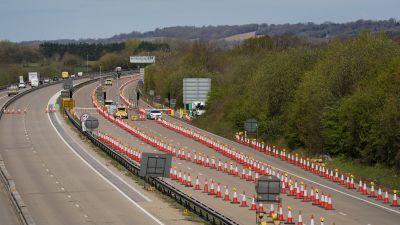Drivers clocked at almost double speed limit in M20 Operation Brock 50mph zone

Two drivers have received fixed penalty notices (FPNs) for driving at almost double the speed limit in the Operation Brock zone of the M20 motorway in Kent.
Operation Brock is a moveable concrete barrier which allows freight and passenger traffic for the Port of Dover to queue on the coastbound carriageway, while all other traffic uses the London-bound carriageway in a contraflow system.
The barriers have been implemented multiple times in the years since the UK left the European Union in an attempt to prevent congestion on local roads by traffic bound for the Dover port or Eurotunnel terminal in Folkestone.
Within the Operation Brock zone, between junctions eight and nine of the M20, there is a 50mph speed limit with average speed cameras in use along the entire stretch.
New figures from Kent Police obtained through a Freedom of Information request show that in the year to April 1 2022, more than 500 FPNs were issued for speeding through the Operation Brock zone.
Some 157 people were issued an FPN for travelling at 57 miles per hour, the most common speed recorded, while 80 people received fines for travelling at 58mph, 61 for travelling at 59mph and 48 for travelling at 60mph.
Two people received FPNs for travelling at 91mph, almost double the 50mph speed limit and the highest speed recorded in the time period.
Of the 506 FPNs issued 123 people paid the penalty, 197 completed a diversionary course, 100 were sent to court for action and 86 were cancelled.
The Freedom of Information request submitted by the PA news agency also asked how many vehicles issued fines were British and how many were foreign registered – but the Kent force was unable to provide this information as foreign vehicles are not tracked.
A Kent Police spokesman said: “All of the FPNs have been issued to UK-registered vehicles. Please note that Kent Police do not issue Notice of Intended Prosecutions (Nips) to foreign-registered vehicles caught speeding by the camera system therefore no subsequent fixed penalty or fines can be issued.
“This is due to the fact it is not possible to trace the registered keeper of the vehicle due to them not being registered with the DVLA. As such the driver cannot be identified.
“These vehicles are monitored and repeat vehicles are investigated and may be targeted by local police teams to obtain the driver’s name and address.”
The news comes as Operation Brock will be implemented again this weekend ahead of the upcoming summer getaway.
Simon Jones, strategic planning lead at the Kent Resilience Forum (KRF), said: “Port of Dover and Eurotunnel are both reporting high booking numbers through July and August, with an increase in tourist traffic from Friday July 15 and Friday 22 to Sunday July 24 set to be particularly busy as tens of thousands of families head to Europe during the school holiday season.
“Combined with routine freight and local traffic, plus tourists travelling to our own great beaches and visitor attractions, we know Kent’s roads will be heavily used.
“KRF partners have agreed to implement Brock to ensure that if we need to step up managing EU-bound freight to protect local communities, keep Kent and goods moving as smoothly as possible and give people the opportunity to reach their destination quickly and safely over this period, we can quickly do so.”
The barrier was first deployed in December 2020 and has been used intermittently since then.
Steve Gooding, director of the RAC Foundation, said: “While Operation Brock might offer the best available temporary fix to help Kent cope with the traffic pressures of the summer getaway, surely there comes a time when what’s needed is a long-term solution?
“It doesn’t look like our desire to enjoy a summer getaway is going to go away anytime soon, and that means the challenge of coping with Kent’s seasonal port traffic warrants some fresh creative thinking if we’re not going to be reliving the same old jams year after year.”